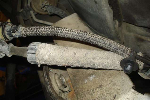ThorChristian
Active Member
- Joined
- November 3, 2018
- Messages
- 52
- Reaction score
- 2
- Year, Model & Trim Level
- 2016 XLT 4WD
I just picked the car up and everything seems ok. However, I won't be positive until the car runs a while and I don't get those magical chimes and the battery warning light for a good while.
Interesting thought about the battery being bad. I just tried starting my second car, and that battery was also dead. What are the odds? The batteries are both AC/Delco, and the second car battery is less than a year old. I bought both batteries at the same place, and both have 30 month full replacement, so that's the good news. The bad news is I can't believe two new batteries seem to be having trouble, and the one in my second car is dead. Maybe my house was hit with an EMP. (Haha). Or maybe it's just a coincidence. I'm charging the second battery now.
I'll update the thread whenever I have an update, or maybe in a week or so if everything is ok. If this is something others are seeing, maybe we can all figure out what is going on, and make the next person who deals with this have an easier time.
Does anyone know if Ford pushes software updates to the car automatically? Would something like that potentially cause a monitoring system glitch like this?
Thanks everyone for your input.
Interesting thought about the battery being bad. I just tried starting my second car, and that battery was also dead. What are the odds? The batteries are both AC/Delco, and the second car battery is less than a year old. I bought both batteries at the same place, and both have 30 month full replacement, so that's the good news. The bad news is I can't believe two new batteries seem to be having trouble, and the one in my second car is dead. Maybe my house was hit with an EMP. (Haha). Or maybe it's just a coincidence. I'm charging the second battery now.
I'll update the thread whenever I have an update, or maybe in a week or so if everything is ok. If this is something others are seeing, maybe we can all figure out what is going on, and make the next person who deals with this have an easier time.
Does anyone know if Ford pushes software updates to the car automatically? Would something like that potentially cause a monitoring system glitch like this?
Thanks everyone for your input.










